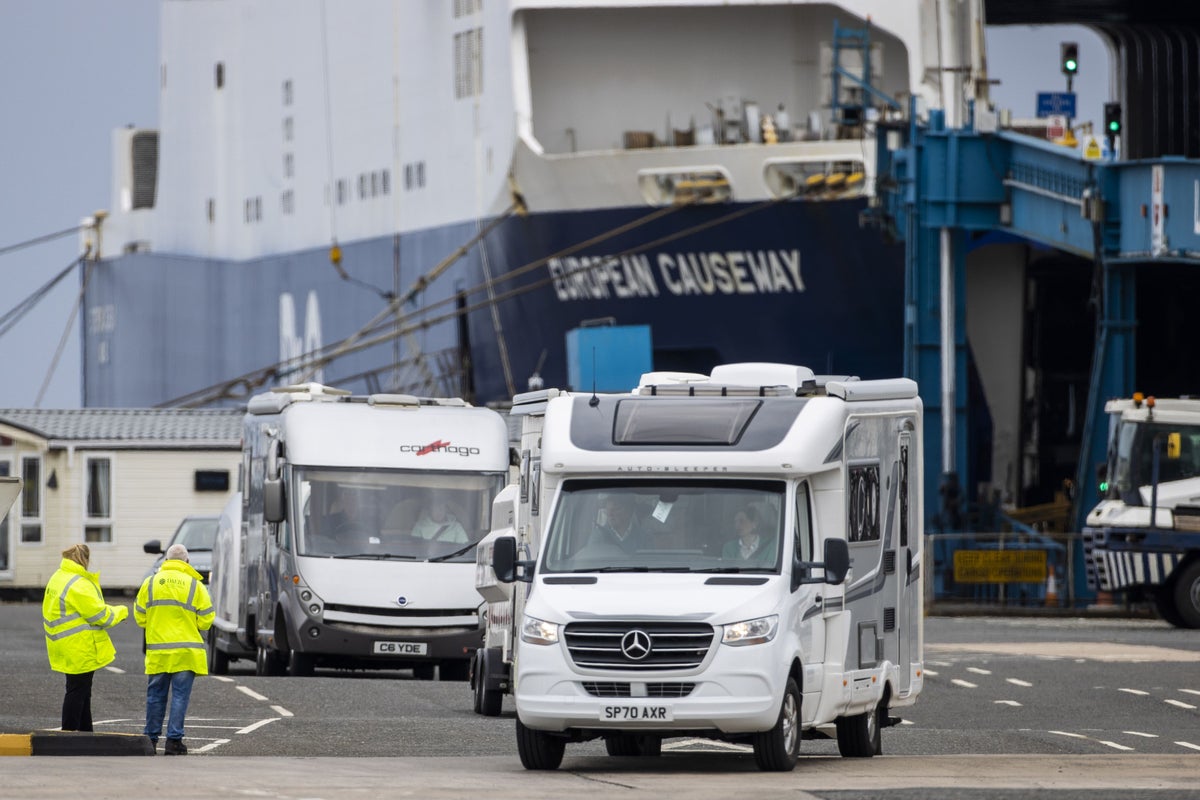
The Windsor Framework did not correct an “underlying mistake” in the Northern Ireland Protocol, a Westminster committee has heard.
The House of Lords European Affairs Sub-Committee on the Windsor Framework heard the claim during a public evidence session in its inquiry into regulatory divergence.
It also heard criticism around the amount of information given to businesses trying to work with the post-Brexit trading arrangements.
Unionists in Northern Ireland strongly criticised the protocol, with the DUP withdrawing from the Stormont Assembly in protest.
This fundamental analytical error I'm referring to is to accept as the Windsor Framework does, and as the protocol did before it, the application of foreign law and foreign courts over parts of the United Kingdom— James Webber, Shearman and Sterling
Prime Minister Rishi Sunak earlier this year re-entered negotiations with the EU and agreed the Windsor Framework.
But DUP leader Sir Jeffrey Donaldson is maintaining his party’s protest, and seeking further action from the UK government on unionist concerns at trading arrangements, and the separation of Northern Ireland from the rest of the UK.
James Webber, a partner at the legal firm Shearman and Sterling, said he was “pessimistic” about what the Windsor Framework had achieved.
He said he believed the framework “embeds a fundamental analytical error that was made when the Northern Ireland Protocol was first conceived”.
“The practical effects of that error will worsen I think, over time,” he told peers, describing Northern Ireland as a “no-man’s-land” not exactly replicating either Great Britain or the EU.
So I'm a pessimist I'm afraid in respect of what the Windsor Framework has achieved, doesn't mean it's achieved nothing, but I think it reflects an underlying mistake, which remains uncorrected— James Webber, Shearman and Sterling
“This fundamental analytical error I’m referring to is to accept as the Windsor Framework does, and as the protocol did before it, the application of foreign law and foreign courts over parts of the United Kingdom.”
He went on: “Much of the work of the Windsor protocol is in easing east/west trade flows.
“None of it actually alters the fact that EU law, essentially a foreign system of law, is applying to the production of goods inside Northern Ireland, and I think the deadweight costs of trying to work out which rules apply to you and in which direction divergence is affecting your business is likely to discourage investment and reduce trade volume and favour those incumbents who are finally able to thread the needle and work out how the system works over new entrants, and that will over time reduce competitiveness, productivity, economic and wage growth.
“So I’m a pessimist I’m afraid in respect of what the Windsor Framework has achieved, doesn’t mean it’s achieved nothing, but I think it reflects an underlying mistake, which remains uncorrected.”
In the same session, Anton Spisak, head of political leadership at the Tony Blair Institute for Global Change, said the regulatory divergence was “now a fact of life simply because the UK has left the European single market and the customs union, and it is not under an obligation to follow EU legislative changes”.
In an earlier session, Joel Reland, research associate at UK in a Changing Europe, was asked about the capacity of a future Stormont Executive to align when there are rules changes in either the UK or the EU.
“There’s currently no Executive, which means that we’re not really able to make any assessment of it,” he said.
“So when the Executive, at some point presumably comes back to power, it is going to have to learn how to make policy if it wants to maintain alignment with Great Britain and that is a really, really, really hard thing to do.”
Committee chair Lord Jay of Ewelme agreed with that point, adding: “I think your last point is something which has bothered the committee quite a lot over the last few months.”
Meanwhile, there was also criticism of government over the amount of information for businesses.
From a Northern Ireland perspective, there isn't even an official comprehensive record of what law is applicable under the protocol and framework because that's not a service that legislation.gov.uk are providing at present— Dr Lisa Claire Whitten, Queen’s University Belfast
Mr Reland said there were some “flagship pieces of divergence”, such as new state aid and procurement regimes where government had engaged with businesses.
“But when in more everyday policy-making, things are happening and there is a potential divergence element I’m not sure business has been consulted anywhere near as much as it should be,” he said.
Dr Lisa Claire Whitten, a research fellow in post-Brexit governance at Queen’s University Belfast, said the process of dealing with regulatory diversions had been “reactive rather than strategic”.
“To date, it is piecemeal and ad hoc in terms of how it’s being dealt with,” she said.
“From a Northern Ireland perspective, there isn’t even an official comprehensive record of what law is applicable under the protocol and framework because that’s not a service that legislation.gov.uk are providing at present.”
She added: “But we’re at a point now when we have got relative legal certainty on the arrangements and on the wider UK/EU relationship so now is the time to develop that strategy and address this issue so that it doesn’t get worse, and there is possibility for that.”







